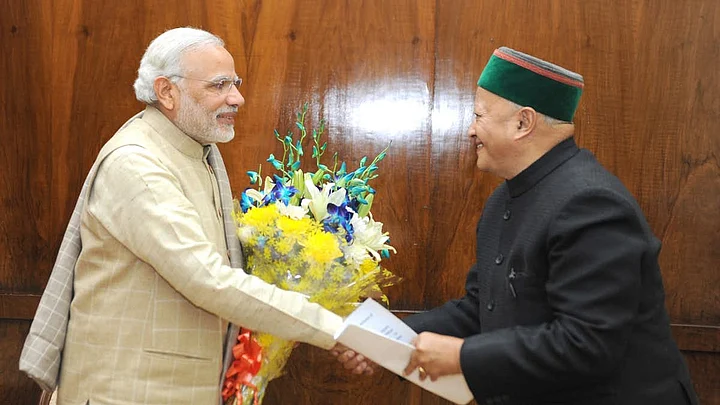With Assembly polls set to take place in Himachal Pradesh on 9 November and Gujarat on 14 December, there has been a raging electoral debate on the development between the Congress and the Bharatiya Janata Party (BJP), the two primary contenders for power in each state.
Since 1990, Gujarat has been governed by the BJP. Over the same period, HP has been alternatively governed by the Congress and the BJP – 15 years by the Congress and 12 by the BJP – according to Election Commission data.
IndiaSpend analysed different government data and found that while HP’s per capita income is almost equal to Gujarat’s, the Himalayan state is better off in six of seven social indicators we considered: Infant mortality rate (IMR), sex ratio, literacy rate among men and women, underweight prevalence among children, crime rate against women and crime rate against scheduled castes (SCs).
Among 29 states, Gujarat is India’s second-most industrialised state by gross valued added, its state gross domestic product is fourth-highest in the country, and it is ranked fifth by per capita income, according to government data, IndiaSpend reported on November 2, 2017.
Despite Gujarat’s economic power – the state produces almost 7.5% of India’s gross domestic product – HP does better than Gujarat on the social indicators we chose, barring the rate of cognisable crimes (which the police can investigate without a magistrate’s order) against women. While Gujarat registered 26.3 crimes per 1,00,000 women, the figure was 37.4 in HP, according to 2015 data from the National Crime Records Bureau.
In relation to cognisable crimes against SCs, Gujarat reported 25.7 crimes per 100,000 SCs, compared to 5.5 in HP, data show. In Gujarat, 95 of 100 suspects in crimes against SCs are acquitted, IndiaSpend reported on July 23, 2016.
More than 39% of children in Gujarat are underweight–the national average is 36%–compared to 21% in HP, according to the National Family Health Survey 2015-16, the latest available data. Gujarat is ranked 25th among 29 states–only ahead of Uttar Pradesh, Madhya Pradesh, Bihar and Jharkhand.
As many as 33 infants die per 1,000 live births in Gujarat, compared to 28 in HP, according to the Sample Registration System Statistical Report 2015, the latest available data.
Also Read: Cong Demands SIT Probe into Death of Infants in Gujarat Hospital
In Gujarat, there are 919 women per 1,000 men, compared to 972 women per 1,000 men in HP, according to census data. The sex ratio of 919 in Gujarat is a minor decline from 920 in 2001, though there was an improvement in the child sex-ratio from 883 to 890 between 2001 and 2011, IndiaSpend reported on June 23, 2015.
Among urban areas, Mahesana (762 girls per 1,000 boys) in Gujarat reported the lowest child sex ratio in India, followed by Agra (772) and Modinagar (778) in Uttar Pradesh, and English Bazaar (781) in West Bengal, IndiaSpend reported on August 2, 2017.
Also Read: Politicians Distribute Liquor to Get Votes: Women’s Group in Surat
(This article was originally published on IndiaSpend and has been republished with permission.)
(At The Quint, we question everything. Play an active role in shaping our journalism by becoming a member today.)
